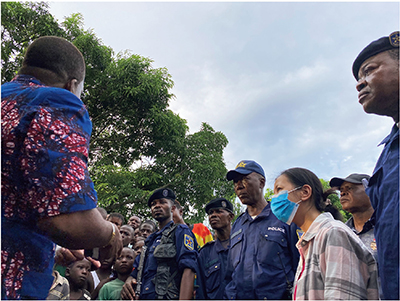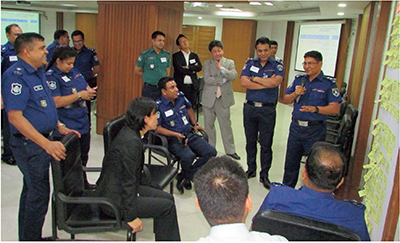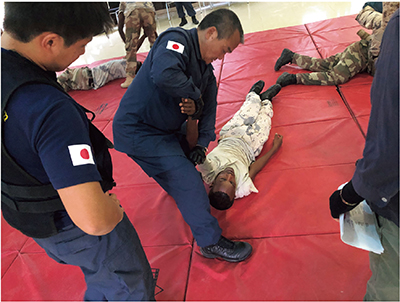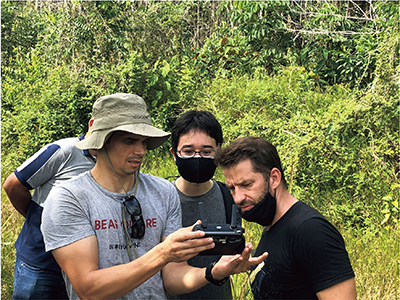(2) Ensuring Safety and Stability in Society

An inspection of a police substation conducted during police training in Kinshasa, Democratic Republic of the Congo (Photo: JICA)
Transnational organized crime and acts of terrorism continue to pose a threat to the entire international community. Effective response to these threats cannot be achieved by the efforts of a single nation alone. Therefore, in addition to strengthening countermeasures by individual nations, the entire international community must work together through assistance to build capacity in the fields of justice and law enforcement in developing countries.
As a State Party to the UN Convention against Transnational Organized Crime (UNTOC), a legal framework for preventing transnational organized crime, Japan is promoting international cooperation that includes mutual legal assistance based on the Convention. Additionally, Japan is engaged in international efforts to combat transnational organized crime, including countermeasures against illicit drugs (see Part III, Section 1 (2) for measures against threats to cyberspace).
For Japan, which depends on imports for a large part of its energy resources and food, ensuring marine traffic safety, including through addressing threats to maritime transport, is an issue that directly affects its existence and prosperity. A free and open maritime order based on the rule of law is extremely important not only for the realization of a Free and Open Indo-Pacific (FOIP) promoted by Japan but also for the development of the entire region including Japan. Therefore, Japan cooperates with various countries and international organizations to promote efforts to ensure marine traffic safety and maritime security cooperation (see “ODA Topics” regarding initiatives for the realization of a Free and Open Indo-Pacific (FOIP)).
● Japan’s Efforts
■ Enhancing the Capabilities of Security Authorities
Based on the track records and experiences of the Japanese police in international cooperation, they provide support for establishing systems, improving administrative capacities, and developing human resources, while transferring knowledge and skills to police agencies in developing countries, who play a key role in maintaining security.
As one example, in 2023, the National Police Agency (NPA) of Japan dispatched experts and provided training and technical cooperation projects to Indonesia, which continued from 2001, while receiving trainees from countries in Asia, Africa, and Oceania to show them how the Japanese police act.
■ Counter-Terrorism
The environment surrounding terrorism has changed greatly as a result of the spread of COVID-19. Although the restrictions on movement as a countermeasure against COVID-19 have reduced terrorism in urban areas, the increasing dependence of people on information and communication technology (ICT) facilitates the spread of extremism by extremist groups using the internet and social media. In some areas where the governing capacity of the nation was already vulnerable, the spread of COVID-19 has further degraded the governance and helped expand the scope of terrorist organizations’ activities. Some have pointed out the possibility of a number of terrorist attacks as a result of the easing of movement restrictions that were a countermeasure against COVID-19.
In 2023, Japan has strengthened cooperation and information exchange with other countries in order to respond quickly to changes in the environment surrounding terrorism, through measures such as holding counter-terrorism dialogues with partner countries and hosting the G7 Rome-Lyon Group meeting in Japan as the G7 Presidency.
■ Countermeasures against Illicit Drugs

A workshop for problem analysis conducted under the “Project for Strengthening Crime Prevention Capacity of Bangladesh Police” (Photo: JICA)
While actively participating in relevant international conferences such as the Commission on Narcotic Drugs (CND) under the UN, Japan proactively makes efforts to combat illegal drugs as an issue to be tackled globally. In 2023, Japan provided financial contributions to the United Nations Office on Drugs and Crime (UNODC) to monitor the distribution of illicit drugs, including new compounds,Note 42 strengthen border control capabilities, and continuously survey the illegal cultivation of opium poppy, a raw material used in drug production, in cooperation with related organizations in Southeast Asian and other countries.
In addition, the NPA invites officials from countries mainly in the Asia-Pacific region to share information on the regional drug situation, relevant investigational measures, and modes of international cooperation, and strengthen cooperative structures.
■ Measures against Trafficking in Persons
Based on the “Protocol to Prevent, Suppress and Punish Trafficking in Persons Especially Women and Children,” a comprehensive international agreement concerning trafficking in persons,Note 43 and Japan’s “2022 Action Plan to Combat Trafficking in Persons,” Japan is engaged in various efforts to eradicate trafficking in persons.
Japan provides support to foreign victims of trafficking who are sheltered in Japan, through its contribution to the International Organization for Migration (IOM), for their safe return to their home countries, and their independence and social rehabilitation through the provision of mental health and medical assistance and vocational training. Japan supports measures against trafficking in persons and efforts to strengthen the law enforcement capacity in Southeast Asia and other countries, through bilateral technical cooperation and financial contributions to projects delivered by UNODC and other UN agencies. Japan also cooperates in strengthening border control and taking measures against trafficking in persons as part of its support for Ukraine and Moldova, which have seen large numbers of refugees and displaced persons due to Russia’s aggression against Ukraine. In addition, Japan provides financial contributions to and participates in the Bali Process, an Asia-Pacific regional framework against people smuggling, trafficking in persons, and related transnational crime.
■ International Measures against Money Laundering and Terrorist Financing
There is a high risk for the profits of transnational organized crime to be used to fund further organized crime or acts of terrorism, and thus, eliminating such flows of illicit funds is an important task for the international community. Therefore, Japan actively participates in discussions on international measures against money launderingNote 44 and terrorist financing through intergovernmental frameworks such as the Financial Action Task Force (FATF).Note 45 In order to implement effective global measures against money laundering and terrorist financing, each country needs to properly implement the international standards in this field set by the FATF so as not to create loopholes in the measures. Assistance for countries and regions with insufficient capacity and resources to deal with money laundering and terrorist financing will contribute to the improvement of international measures to counter money laundering and terrorist financing. Therefore, Japan provides assistance for FATF-style Regional Bodies, which promote the effective implementation of the FATF standards in non-FATF member countries, with a particular focus on supporting activities such as technical assistance conducted by the Asia Pacific Group on Money Laundering (APG), an FATF-style Regional Body in the Asia-Pacific region.
■ The Seas

Suppression training conducted under the “Project for Capacity Development of Djibouti Coast Guard Phase III” in Djibouti (Photo: Japan Coast Guard)
In order to establish and promote the rule of law at sea, Japan seamlessly supports the improvement of the law enforcement capacity of maritime security agencies in the Indo-Pacific region through the provision of patrol vessels and technical cooperation, while promoting cooperation for capacity building in Maritime Domain Awareness (MDA) among recipient countries. Specifically, Japan promotes human resources development through the training and dispatch of experts for maritime countries along the sea lanes important to Japan, including Indonesia and Malaysia, in addition to providing vessels and maritime security-related equipment to the Philippines, Viet Nam, and other countries. Furthermore, Japan supports Pacific Island countries, such as Samoa and the Federated States of Micronesia, through providing patrol vessels and other equipment related to maritime security and safety to Pacific Island countries as well as supporting them through a grant aid project, “Project for Strengthening Capacity of Maritime Law Enforcement Agencies for Effective Maritime Crime Control in the Pacific Island Countries (UN Cooperation / UNODC Implementation).”
As an effort to promote regional cooperation in countering piracy and armed robbery against ships in Asia, Japan led the formulation of the Regional Cooperation Agreement on Combating Piracy and Armed Robbery against Ships in Asia (ReCAAP), and supports its activities. Since 2017, Japan has implemented its comprehensive training programs aimed at capacity building for maritime law enforcement agencies of the ReCAAP Contracting Parties. In 2023, 12 countries, including the ReCAAP Contracting Parties, Indonesia, and Malaysia, participated in this training program to share their best practices, which contributed to deepening the anti-piracy-related knowledge of the participating countries and to promoting cooperation among coastal countries.
In order to counter the threat of piracy off the coast of Somalia and in the Gulf of Aden in Eastern Africa, Japan has been conducting anti-piracy operations since 2009. Moreover, from FY2009 to FY2019, Japan contributed a total of 15.53 million US dollars to the Djibouti Code of Conduct Trust Fund, which was founded by the International Maritime Organization (IMO) to implement the Djibouti Code of Conduct.Note 46 This Trust Fund was used to establish information-sharing centers for anti-piracy measures and the Djibouti Regional Training Centre, where training programs to improve maritime security capacities in countries neighboring Somalia have been held.
In cooperation with the Japan Coast Guard, Japan holds maritime law enforcement training courses on anti-piracy measures for Asia and off the coast of Somalia. In 2023, 17 maritime security officers from 13 countries in total participated in the courses. Recognizing that the reconstruction and stability of Somalia are essential for a fundamental solution to the piracy issue in the area, Japan has disbursed a total of 579 million US dollars since 2007 for the restoration of basic social services, improvement of policing capabilities, and revitalization of domestic industries in Somalia.
Oil spillages from ships that occur on sea lanes not only have an impact on the safe navigation of ships passing through, but can also cause fatal damage to the fishery and tourism industries of coastal countries by polluting the coast. Hence, it is important to strengthen the capacity for dealing with such oil spill incidents. In March 2023, Japan dispatched the Japan Disaster Relief (JDR) Expert Team to respond to the oil spill disaster caused by a small tanker that capsized and sank off the coast of Mindoro Island in the central Philippines (see Part III, Section 2 (4) for the details of JDR).
The International Hydrographic Organization (IHO) has been conducting a training program in the United Kingdom every year since 2009 with the aim of nurturing nautical chart experts in developing countries. This program is carried out with grant assistance from the Nippon Foundation. The training program has produced 92 graduates from 49 countries by December 2022. The IHO and Intergovernmental Oceanographic Commission (UNESCO-IOC) are engaged in a joint project to create the General Bathymetric Chart of Oceans (GEBCO), a topographical map of the world’s seafloor. The map is under revision through the cooperation of experts around the world, including the Hydrographic and Oceanographic Department of the Japan Coast Guard.
■ Outer Space

Project participants checking drone footage during a field survey using satellite and AI technology under the “Project for improving control of illegal deforestation through advanced SAR and AI technologies in the Brazilian Amazon” in Brazil (Photo: JICA)
Japan contributes to addressing global issues, including climate change, disaster risk reduction, marine and fishery resource management, agriculture, forest conservation, as well as natural resources and energy, through the implementation of development cooperation and capacity building assistance utilizing space technology. Japan also proactively provides assistance in the field of human resources development for emerging countries in their efforts toward space development and utilization. In particular, Japan’s initiatives, such as providing opportunities to utilize the space environment and deploying CubeSats by utilizing Japanese Experiment Module “Kibo” on the International Space Station (ISS), are highly acclaimed in the international community. From June to December 2023, a new round for the application to the “KiboCUBE” program (the 8th round) was conducted.Note 47 As of 2023, the Central American Integration System (SICA), Mexico, and Tunisia, which were selected in the previous rounds, are developing CubeSats under the program.
Japan formulated a basic policy in 2016 to strategically and effectively provide all-Japan support for the capacity building of emerging space faring nations and has actively supported such nations. For example, Japan is conducting forest monitoring in 78 countries in the regions of Asia, Africa, and Latin America and the Caribbean, utilizing a tropical forest monitoring system (JICA-JAXA Forest Early Warning System in the Tropics: JJ-FAST) that uses satellite data from “ALOS-2.”
In order to contribute to the realization of the rule of law in outer space, Japan provides capacity building assistance to emerging space faring nations in the development and operation of domestic space-related laws. Since Japan began cooperating with the UN Office for Outer Space Affairs (UNOOSA)’s “Space Law for New Space Actors Project” in FY2021, Japan has been providing assistance to emerging space faring nations in the Asia-Pacific region for the development and operation of domestic space-related laws and regulations. Japan also contributes to building the legal capacity needed to properly manage and supervise their space activities, including private-sector activities. In 2023, Japan conducted legal capacity building assistance for countries in the Asia-Pacific region, focusing on supervision as well as licensing of space activities.
- Note 42: New Psychoactive Substances (NPS). Also known as “designer drugs.” These are substances that are produced synthetically to have effects similar to controlled drugs (narcotics, etc.). They are not recognized as legal medicines, and are compounds that exhibit unregulated psychotropic effects.
- Note 43: The act of recruitment, transportation, transfer, harboring, or receipt of persons for the purpose of exploitation, such as forced labor or prostitution (Article 3 (a) of the Protocol to Prevent, Suppress and Punish Trafficking in Persons Especially Women and Children).
- Note 44: The act of disguising criminal proceeds as legally obtained assets, or the act of hiding such funds. One example is the act in which a drug dealer hides money gained through drug trafficking in a bank account opened under a false name.
- Note 45: Established based on the Economic Declaration of the Arch Summit (G7 Summit) in 1989.
- Note 46: A regional cooperation framework for Somalia and its neighboring countries.
- Note 47: A cooperation program between the UN Office for Outer Space Affairs (UNOOSA) and the Japan Aerospace Exploration Agency (JAXA) that provides developing countries with the opportunity to deploy CubeSats from “Kibo.”
